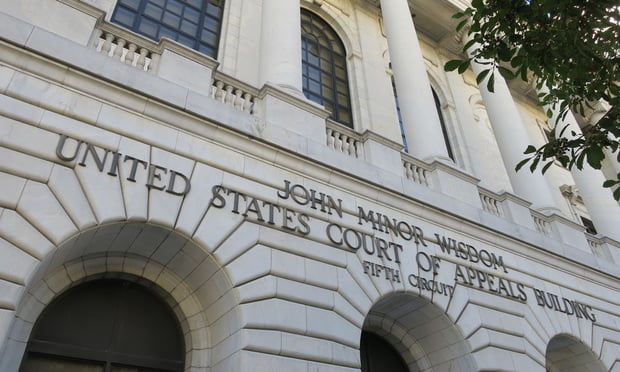 U.S. Court of Appeals for the Fifth Circuit in New Orleans. Photo: Mike Scarcella/ALM
U.S. Court of Appeals for the Fifth Circuit in New Orleans. Photo: Mike Scarcella/ALM
The U.S. Court of Appeals for the Fifth Circuit in New Orleans will hear oral arguments Tuesday on whether the NCUA’s administrative enforcement process is unconstitutional.
Former Edinburg Federal Credit Union President/CEO Jeffrey Moats filed the appeal in April 2024 after a Texas federal district court judge dismissed his lawsuit, which claimed the federal agency's administrative charges violated his constitutional rights. U.S. District Court Judge Jeffrey Vincent Brown in Galveston, Texas, agreed that Section 1786 of the Federal Credit Union Act (FCUA) does not allow federal district courts to review constitutional challenges of the NCUA’s adjudicatory structure.
Recommended For You
In March, however, the Appeals Court agreed to hear oral arguments, suggesting the appellate judges see potentially significant constitutional issues with the FCUA’s Section 1786.
The NCUA fired Moats from the $93.9 million Edinburg Teachers Credit Union (ETCU) in Edinburg, Texas after it was conserved in 2021. Two years later, the federal agency issued a four-count notice of charges with the U.S. Office of Financial Institution Adjudication (OFIA), accusing the former CEO of legal violations and fiduciary breaches that allegedly caused more $4 million in losses to credit union. The OFIA is an interagency group of administrative law judges based in Arlington, Va.
In his appellate brief, Moats argued that nothing in the FCUA’s Section 1786 “expressly or impliedly precludes district courts from deciding the structural constitutionality of NCUA/OFIA adjudication.”
Section 1786 outlined the NCUA’s authority of the federal agency to terminate the insured status of credit unions, issue cease-and-desist order, suspend or remove officers or directors impost civil penalties, and initiative conservatorship or liquidation proceedings.
Moats’ legal team contended that the NCUA does not adequately address precedent on “express jurisdictional bars,” particularly in the case of Shalala v. Illinois Council on Long Term Care, Inc. (2000). That ruling held that federal statutes must explicitly reference 28 federal law 1331 to bar federal court jurisdiction. Because the FCUA Section 1786 does not specifically cite 1331, Moats argued he retains the right to pursue constitutional claims in district court. Section 1331 grants district courts jurisdiction over civil actions arising under the Constitution, including rights such as due process and jury trials — rights Moats claimed are being denied.
The NCUA’s argument, in contrast, cited subsection Section 1786, which reads, “No court shall have jurisdiction to affect injunction or otherwise the issuance or enforcement of any notice or order under this section, or to review, modify, suspend, terminate, or set aside any such notice or order.”
In its appellate brief, the federal agency pointed to the key phrase “no court shall have jurisdiction,” which the U.S. Supreme Court has held as an “explicit bar on jurisdiction.” The NCUA argued this key phrase provides “clear and convincing evidence that Congress intended to deny the district court jurisdiction to review and enjoin the [agency’s] ongoing administrative proceedings,” according to a 1992 Supreme Court ruling, Board of Governors of the Federal Reserve System v. MCorp Financial, Inc.
Moreover, the NCUA asserted that Congress provided for judicial review in the court of appeals, but only after the conclusion of the NCUA’s hearing and the issuance of its final order.
Moats also invoked the U.S. Supreme Court’s 2023 unanimous ruling in Axon Enterprise, Inc. v. FTC. In that case, Axon, under investigation by the Federal Trade Commission, sued in federal court, challenging the FTC’s structural constitutionality. The Court ruled that when a party challenges an agency’s very structure or authority, district courts have immediate jurisdiction, bypassing the agency’s internal processes.
Moats argued his case is akin to Axon, as he is challenging “subjection to all [NCUA/OFIA] authority.” The NCUA countered that Axon is inapplicable because Section 1786 includes an explicit jurisdictional bar that was not present in Axon.
The NCUA is asking the Fifth Circuit to uphold the district court’s dismissal. Moats seeks to reverse and vacate the judgment and have the case remanded for district court consideration of the constitutional claims.
READ MORE: Moats Appeal Argument and NCUA Appeal Argument.
Peter Strozniak can be reached at [email protected].
© Touchpoint Markets, All Rights Reserved. Request academic re-use from www.copyright.com. All other uses, submit a request to [email protected]. For more inforrmation visit Asset & Logo Licensing.







